Score: B
Director: Emilie Blichfeldt
Cast: Lea Myren, Thea Sofie Loch Næss, Ane Dahl Torp
Running Time: 110 Minutes
Rated: NR
“You have talents. Wasted talents.”
The beauty of horror lies in the extremes. While creators can only twist and turn a story in so many directions, successful films find new perspectives. Emilie Blichfeldt does just that with her debut feature, the grim and painfully unsettling The Ugly Stepsister.
As most already know the broad strokes of the film’s Cinderella storyline, Blichfeldt’s retelling offers little in the way of surprises. But where it keeps your attention is in the details as the film digs far below the surface to paint an often uncomfortable, albeit painstakingly addictive, subtext.
Elvira, played beautifully by relative newcomer Lea Myren, doesn’t start the film insecure. She appears confident as she swoons at the mere idea of one day marrying the Prince. Until then, she is satisfied with reading his (horrendous) poetry, allowing her dreams to occupy her mind as she awaits her moment.
But when a marriage undertaken for nothing more than economic security meets a sudden, deadly end, the family becomes desperate as their financial future rests squarely on the broad shoulders of their eldest. The only problem is that she isn’t the looker necessary to catch the eye of royalty. Do not worry; Elvira’s mother has a plan that includes a run of cosmetic surgeries that will quickly cut and hack their way through her daughter, ultimately presenting the budding adolescent in a brand new light.
While the lengths the family is willing to go likely won’t surprise you, Blichfeldt’s stylistic approach is intoxicating. We watch as our protagonist suffers through countless operations, each more agonizing than the one before. But while the initial idea came from her mother, Elvira slowly begins to buy into the reconstruction, even implementing a horribly advised attempt to lose weight without giving up her much-adored bread and sugar.
As we witness the escalating metrics used to transform Elvira’s physical appearance, genre fans will applaud as Blichfeldt never turns the camera from the impending train wreck.
Laced with satire and sarcasm, The Ugly Stepsister does well to embrace the grit, embody the ridiculous, and give viewers an explosive third act. Once Elvira puts on the custom dress, covers her depleted hair, and continues to control her tumbling stomach, the film enters a new gear. And though the first two-thirds of the story focuses on intense, squeamish-inducing moments, it is here that you first realize that up until this point, there hasn’t been much blood.
Do not worry, genre fans. Blichfeldt has you covered. And this tameness is what ultimately helps The Ugly Stepsister leave such a lasting impact. Well, that and some purposefully painful dark jokes that make you question yourself when a laugh escapes your lips.
But even with all my praise, the film does struggle to make a prominent point. The messages are expansive and quick-paced. And the heartfelt sentiment, which is occasionally present, doesn’t get the time it needs to breathe. Often rushed for shock value, the pace prioritizes gruesome spectacle over social commentary as Blichfeldt maintains the perspective of her adolescent protagonist.
This approach is why the film remains emotionally immature, unable to conjure the heartfelt struggles that often embody a person who has lived, loved, and learned. And while the pieces come together in the end, it does so with a stronger sense of sorrow than expected. Who is the villain of this story? I’ve always thought it obvious. Now, I’m not so sure. I guess not all fairytales end with closure and a “happily ever after” mantra.
*Shudder acquired this film prior to its Sundance premiere.

